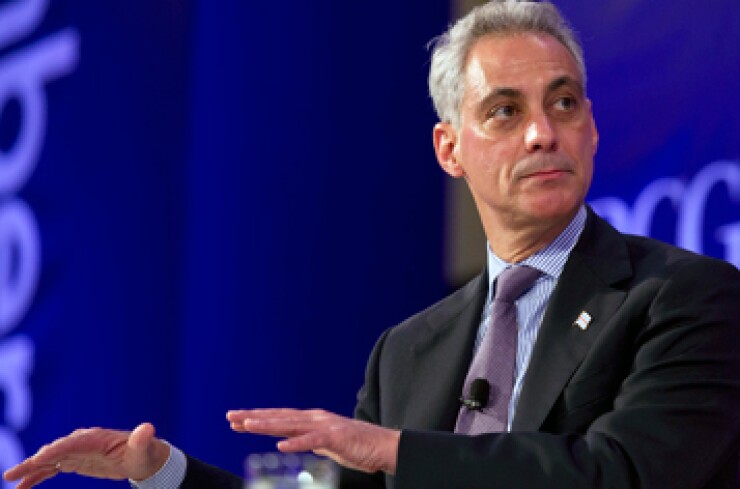
WASHINGTON — Chicago Mayor Rahm Emanuel said Thursday that Congress and the administration should not hurt two federal loan programs for infrastructure: the Transportation Infrastructure Finance and Innovation Act and the Railroad Rehabilitation & Improvement Financing programs.
“My one challenge to Washington, is while you have your dysfunction, don’t let it spread to two accounts,” Emanuel said here at an infrastructure forum sponsored by the Carnegie Endowment for International Peace.
The popular TIFIA program, which is typically over-subscribed, provides direct loans, loan guarantees and standby lines of credit to finance surface transportation programs. State and local governments can receive 30-year loans through TIFIA with lower interest rates than they could normally get, Emanuel said.
Chicago has used the program to finance several projects, including the Chicago Riverwalk. The projects create economic value that is greater than the investment, he said.
Many members of Congress are interested in passing a long-term surface transportation bill but are struggling to figure out how to pay for it. The current law authorizing surface transportation programs expires later this month.
If Congress doesn’t want to raise taxes or fees to fund infrastructure, “I’ll take the political pressure for that, but keep this loan program going,” Emanuel said.
Emanuel joked that he feels bad about even discussing TIFIA, now that he has, “somebody in Washington is going to go try and screw it up even worse.”
The RRIF program provides loans and loan guarantees to finance railroad infrastructure. There are billions of dollars available through the program, but it’s difficult for projects to qualify for the loans, Emanuel said.
Later during the forum, some panelists recommended the revival Build America Bonds, taxable, direct-pay bonds for which the Treasury Department makes subsidy payments to the issuer. BABs, created by the American Recovery and Reinvestment Act, were issued in 2009 and 2010. The panelists encouraged reinstating the BAB program because it would encourage investment in U.S. infrastructure from pension funds and international investors that can’t invest in tax-exempt bonds.
Bringing back BABs “should be a no-brainer,” said Heidi Crebo-Rediker, a senior fellow at the Council on Foreign Relations.
Damon Silvers, director of policy and special counsel for the AFL-CIO, said BABs are a “potentially valuable tool” in mobilizing pension capital because they’re taxable. While it may be complicated for pensions to directly provide equity in an infrastructure project, pension funds regularly buy taxable bonds, he said.
Scott Smith, a former president of the U.S. Conference of Mayors and a former Republican mayor of Mesa, Ariz., said he is bothered by the fact that proposals remain pending in Washington to limit or eliminate the tax exemption for municipal bonds.
Munis are “the number one financing tool for investment in infrastructure in this country, and … the one place where the federal government actually does participate,” he said.
Sen. Mark Warner, D-Va., said that there is some effort in Congress to try to use one-time revenue from international tax reform for infrastructure. He said that any deal in Congress on infrastructure is likely to include an infrastructure financing authority, his term for an infrastructure bank. Earlier this year, Warner introduced a bipartisan bill, called the Building and Renewing Infrastructure for Development and Growth in Employment (BRIDGE) Act, which would create such a financing authority and would also increase the national volume cap for private-activity bonds for highway or surface freight transfer facilities.
Vice President Joe Biden touted the Obama administration’s six-year transportation proposal which would be funded by a one-time, 14% tax on overseas corporate profits.
The proposal should be “a win-win,” he said.
Sen. Elizabeth Warren, D- Mass., said that when politicians say “no new spending no matter what,” they are prioritizing spending on tax loopholes rather than infrastructure investment. The stories of the crumbling of the nation’s infrastructure and the hollowing out of the middle class are “inextricably linked” because both are “the ugly offspring of Republican trickle-down economics,” she said.





